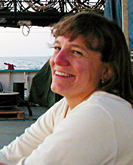Today I was recalling a topic that I discussed years ago with a professional personal coach. At the time, I was preparing to go on another research cruise, this time on an unfamiliar research vessel (from Greece) and with many students and scientists I had not met previously. I was quite anxious about the trip. My vision had deteriorated since the last time I had gone to sea. Through discussions with the coach, I discovered that I was not nervous about performing the responsibilities of the chief scientist—I had enough experience and confidence to be pretty sure I was alright on that front. My coach helped me figure out that my worry was about how I looked to others while getting around the unfamiliar ship with my white cane. How would that look to the ship’s crew and the other scientists? Would they question my competency to run the cruise because I bumped into tables and chairs left askew in the lab or in the galley? Or even walked into a wall? My coach and I talked at length then about the difference between physical and intellectual competency, and how we as humans often link the two together. Of course, there is really no overlap. It is only my perception that some people might equate the two. I like to think that I don’t put too much stock in what others think about me, but when one is going to be in a position of leadership, I think it is important that those working for the leader have some degree of respect for their knowledge and confidence in their ability to make important decisions. So this kind of thinking crept back into my mind these last few days. What must all these new people be thinking as I weave and bump my way through the lab? This question must be one faced by other blind people who need or want to leave the comfort of their office or home to go out into the world for research work (in my case), work-related travel or recreation. I guess I have two choices. I can stay more or less glued to my workstation to minimize exposing my difficulty with navigating the ship. Or I can continue to try to get around as best I can, and probably most importantly, talk to people about my research and what is going on during the cruise. I hope in that way others will learn more about me and my work, and not be left with just a puzzling first impression based on my physical abilities.

 Amy Bower is a physical oceanographer at the Woods Hole Oceanographic Institution. She has been chasing ocean currents in the Atlantic and Indian Oceans for over 25 years, primarily by releasing acoustically tracked floats far below the sea surface. Legally blind since her mid-20s, Amy uses adaptive technology to continue her research.
Amy Bower is a physical oceanographer at the Woods Hole Oceanographic Institution. She has been chasing ocean currents in the Atlantic and Indian Oceans for over 25 years, primarily by releasing acoustically tracked floats far below the sea surface. Legally blind since her mid-20s, Amy uses adaptive technology to continue her research.